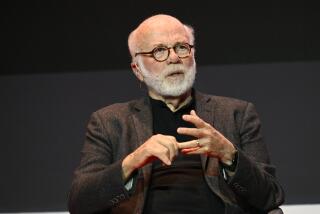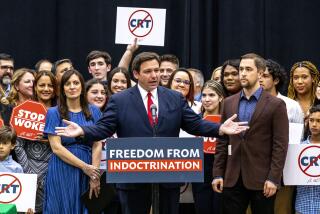Giving Humanities Their Proper Due
- Share via
A few months ago the Louis Harris polling organization reported that Americans were working more and being leisurely less. The 1,500 adults surveyed said they were taking in fewer cultural events because they had less time and, to some extent, less loose change.
But in mid-September Lynne V. Cheney, chairman of the National Endowment for the Humanities, released a report saying in part that in 1986 Americans spent more to attend cultural events ($3.4 billion) than to attend sports events ($3.1 billion). This was in sharp contrast to 1970 when the comparable figures were only a half-billion dollars for cultural capers and $1.1 billion for sports events.
What we seem to have here is another asking of the age-old question: Which poll do you read? Or another proof of the equally ancient truth that figures can prove practically anything.
Actually, Cheney’s cheering, if suspect, figures were the consolation prize in a report whose main theme was negative. The study of the humanities at the university level has dropped alarmingly, she said.
Only one in 16 students was enrolled in the humanities in 1986, as against one in six 20 years earlier. And the number of degrees awarded in the humanities had dropped by 33% in the same period.
Even more alarming, the Cheney report argued, was that students can graduate from more than 80% of American colleges and universities without taking a course in American history, or in the history of Western civilization.
Ethnic studies, heavily politicized in their approach to history, have edged out the traditional survey courses in Western values, ideas and culture, the Cheney report said. The faculty members themselves were researching and publishing more and teaching less--an old complaint that does not go away.
There were other small consolation prizes, as that good books, like Allan Bloom’s “The Closing of the American Mind,” do show up on best-seller lists, and that a good television series will sell good books, as “Brideshead Revisited” sold piles of the Evelyn Waugh novel.
The report received less examination than it deserved, in part (I suspect) because a wire service jumped the official release date, achieving one of the great non-scoops of all time and, in the way of journalism, making new news seem like old news when the information finally came around.
But examination is what the report needs. Do we really believe that culture has overtaken sports as a national enthusiasm, even in dollar terms? Does culture include some, any or all of the videocassette business, which at more than $4 billion annually is now larger than the movie business. Are there cultural and non-cultural movies?
The national Monday-night paralysis occasioned by pro football is regretfully not to be compared with the turnout of 5 million citizens, as the report says, that are estimated to have seen the recent documentary “Huey Long.”
The good news seems dubious and arguable in the extreme. Cheney does say that museum attendance is up, as sampled in some regional meetings that underlay her report. The Harris survey confirmed that, too. Museums and other free or cheap-ticket attractions were doing better than high-cost events.
The decline in humanities enrollment seems directly related to the Yuppie pragmatism of the post-’60s years, in which business education has been the place to be, and enthusiasm for the arts can follow swiftly on the acquisition of the stock plan, the condo and the BMW, in roughly that order.
The rise of ethnic studies has to be read as a pendulum long-tethered and at last swinging free. The humanities may have dealt, neatly enough, with timeless values, but their geographic and ethnic embrace has been so narrow, so underattentive to any but Western European culture, that it is small wonder there has been ferment on campuses (including the younger faculty, as Cheney says) for the inclusion of alternative cultures.
It may be that some Platonist babies have been tossed out with the tepid bathwaters of “The Bible as Living Literature” (one of the legendary breeze courses of my own undergraduate days). But pendulums swing both ways and trend toward centrality; the balance within the study of the humanities will be found, and it will be more embracing and verdant than it has been.
At that, the deeper problem is a kind of enlargement of the division between two cultures that C. P. Snow (Lord Snow, as he became) worried about in his last writings. His concern was how to bridge the gap between the scientists and the culturists (or the humanists). They seemed to him to be speaking different tongues, the layman unable to comprehend the scientist and the scientist uninterested in comprehending anything else.
What we may be seeing is the rise of a third force, call it financial, mercantile, service, whatever. It answers neither to science nor to the traditional disciplines of whatever Cheney means by the humanities. The new force looks neither back toward timeless values, or beyond the short-term future to the longer implications of present developments.
At an American correspondents luncheon in London a few years ago, Prince Philip rather haughtily explained that the difference between British higher education and American higher education was that the British prepare students for the last job they will ever hold, the Americans train them for their first job.
There was a certain hard truth in the remark (as well as a specious rationalization for the scarcity of university places in Britain).
Cheney may well be right that the universities have slid away from the hard challenges of a core curriculum that produces the civilized graduate. But the niceties of Civ. I, skating over the real forces of history and the multiplicities of the world, do not quite do the job.
As Sunday’s acrid presidential debate made clear, one man’s traditional values are not another’s. Cheney does not really spell out which she has in mind, but it ought to be as worrying to ignore Franz Fanon as to ignore Aristotle.
More to Read
Sign up for our Book Club newsletter
Get the latest news, events and more from the Los Angeles Times Book Club, and help us get L.A. reading and talking.
You may occasionally receive promotional content from the Los Angeles Times.










